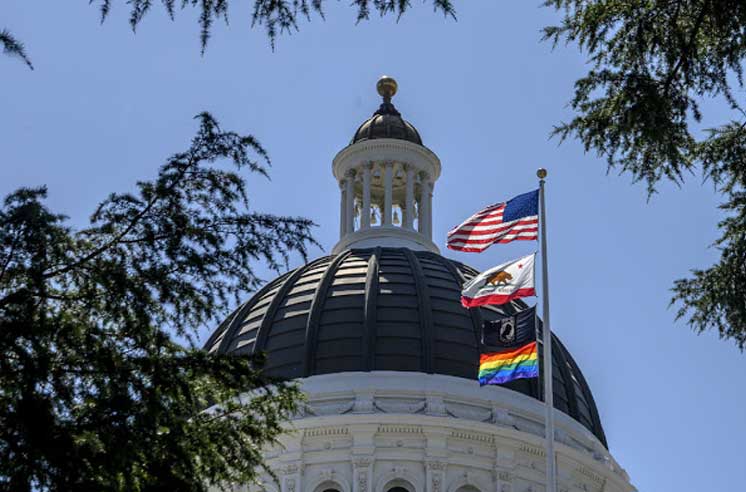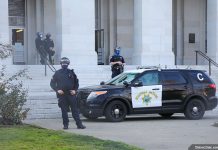Today’s tale features Sergei Ulyanov, a Belarusian actor and musician who sought refuge in the United States due to the threat of persecution in his homeland. After numerous attempts, he successfully crossed the border from Mexico, determined to carve out a new life in Los Angeles.
Ulyanov is unapologetically open about his sexual orientation, offering guidance to fellow Belarusians seeking a safe exit from their country.
His choice to settle in California was deliberate; it’s a breeding ground for talent, where opportunities abound.
Within a year of his arrival, Ulyanov obtained an American driver’s license, exploring the state and landing roles in commercials, all while residing near the picturesque coastline.
Fearless in expressing himself, Ulyanov anticipated criticism regarding his sexual orientation in Russia or Belarus. However, he hadn’t anticipated similar inquiries from Americans, questioning his boldness in openly identifying as LGBT.
Currently residing with a 68-year-old American, Ulyanov was surprised when his housemate asked him to remove a rainbow-colored hat from his car.
Such encounters challenged his initial perception of California as a bastion of unfettered expression.
As Ulyanov settled into life in the United States, he encountered voices cautioning about potential dangers in his newfound home. However, he is yet to encounter overt homophobia.
It was in America that Ulyanov came to recognize his role as an activist, although he prefers the term “enthusiast” as it feels more aligned with his modest nature.
Back in Belarus, he dedicated seven years to supporting the LGBTQ+ community through an organization, distributing condoms, and facilitating access to STI testing and treatment.
Leveraging his web design skills, Ulyanov took on the responsibility of creating informational materials like booklets, posters, and websites to promote public health initiatives, a project supported by the United Nations Global Fund.
Back in his homeland, Ulyanov faced constant harassment, often needing to evade angry confrontations, even resorting to fleeing from hostile individuals. While the difference in Russia was less pronounced, Ulyanov noted a higher prevalence of gay clubs during his time there.
Sergei’s arrival in Ukraine coincided with the looming shadow of conflict. When he arrived on February 11, 2022, he did feel the tense atmosphere, but like many others, he couldn’t anticipate the abrupt eruption of war.
Awakening to the jarring sound of explosions, he knew it was time to depart.
With a curfew in place and tensions escalating, Sergei swiftly secured a bus ticket on February 25th, 2022, bound for Odessa. From there, his plan was to journey to Turkey, specifically Antalya, where friends awaited in Kalkan (a municipality in Antalya Province).
Navigating his way out of Ukraine proved challenging. Scarce transportation options made reaching the train station a daunting task, prolonging his journey to Kyiv. However, luck was on his side when he managed to promptly board a bus.
Suspicions and tensions mounted as accusations were leveled against Sergei and other Belarusians, prompting questions about their presence and motives in Ukraine. Were they foreign agents or spies? Ukrainians couldn’t believe he came to Odessa by chance, since it was expected to be bombed any day now.
Initially planning to depart via air, Sergei found himself grounded as airports shuttered their operations due to the escalating situation. Despite purchasing tickets in good faith, he encountered resistance in to securing refunds amid the chaos.
Getting to Turkey proved to be a labyrinthine journey for Ulyanov. Learning through a Telegram channel that exit from the country was permitted at the border without a visa for those with onward tickets, he set his sights on crossing into Romania. Purchasing a ticket departing from Constanta, a Romanian city just 2.5 hours from the border, seemed like the most viable option.
However, the path to the border was fraught with obstacles. Spiraling ferry fees, totaling 100 euros for the trip from Odessa, presented a financial hurdle, compounded by the requirement for payment in advance and reluctance to accept the Ukrainian currency.
After a grueling 5 hours at the border, Ulyanov faced obstacles to his departure. Recent reports of Belarusian tanks advancing toward Ukraine had heightened tensions, seemingly impacting border control operations.
Sergey asserts that the majority of Belarusians oppose the war in Ukraine, with only the country’s president showing interest in it. Despite rallies and protests, they had little impact as people came to the realization that decisions had already been made.
Despite facing scrutiny and having his belongings meticulously inspected, Ulyanov eventually boarded a ferry, reaching the Romanian side. Yet, challenges persisted as border guards mistakenly assumed he sought political asylum, hampered by language barriers and communication difficulties.
After an arduous 8-hour effort to clarify his intentions, Ulyanov finally managed to navigate through the bureaucracy and set his course for Antalya. He had given up his idea of seeking political asylum in Romania because all he wanted at that point was to rest and recover. However, exhaustion took its toll, leading him to miss his flight due to a simple oversight: forgetting to adjust his watch to the local time. Undeterred, he secured a new ticket and awaited the next available flight, eventually arriving in Kalkan, weary but resolute in his quest for safety.
Upon reaching Turkey, Ulyanov found some respite, continuing his work remotely for the same organization. Despite the promising salary, his plans for a brief stay in Turkey were upended when money transfers became blocked, ushering in a new chapter of uncertainty.
Transitioning from his role in marketing to managing logistics for a chain of affordable family stores during the war, Ulyanov navigated the complexities of supply routes, ensuring goods reached their destination amidst the threat of bombings. He monitored Belarus and Europe to pinpoint areas where bombings were likely to occur. This approach enabled him to adjust routes as needed to safeguard the goods. However, such efforts were viewed unfavorably in Belarus and labeled as extremism.
Facing a two-month salary delay and relying heavily on the support of friends, Ulyanov realized the need for a more stable solution. Hence, he made the decision to pursue political asylum in California.
His choice drew criticism and stigma, deemed unfavorable for all three countries – Belarus, Moscow (where his sister resided), and Ukraine. Nevertheless, Ulyanov now actively advocates for individuals seeking to escape homophobic regimes, leveraging his own experiences to shed light on the opportunities available in the United States.
Sharing his insights, Ulyanov highlights the accessibility of free legal aid, shelter, and financial assistance provided by the state, aiming to dispel fear and uncertainty. He refrains from urging others to leave their countries, but rather presents the option as a means of empowerment.
Reflecting on his past activism in Belarus, where he faced personal repercussions for championing LGBTQ+ rights, Ulyanov believes he has fulfilled his obligations to his homeland. Now, he endeavors to empower others by offering them the freedom to choose their own paths.
Now settled in California, Ulyanov finds contentment in his new surroundings. While he navigates the process of obtaining a work permit and establishing himself, he believes the journey has been worthwhile. In America, he revels in the liberties afforded to him – freedom of choice, speech, religion, and sexual orientation.
Recognizing that his path may not be suitable for everyone, Ulyanov refrains from encouraging others to embark on a similar journey unless they are dissatisfied with their current circumstances. He acknowledges that the decision to leave one’s homeland entails significant risks and should not be taken lightly.
Despite occasional pangs of nostalgia, Ulyanov harbors no longing for Belarus and has no plans to return. Instead, he is focused on seizing opportunities for personal growth and fulfillment in America, with aspirations that include receiving an Oscar.
Concurrently, he remains committed to assisting others, offering guidance and support in various capacities.
Though relations with his relatives remain strained, signs of reconciliation emerge gradually.
Yet, the prospect of returning to Belarus is marred by the looming threat of danger, dissuading any consideration of a homecoming.
Vitaly Ataev Troshin, SlavicSac.com
California Local News Fellowship





